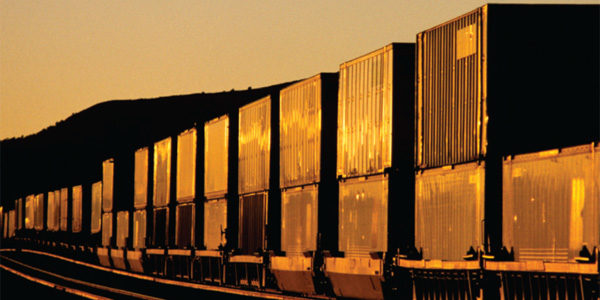UPS places multi-year order for intermodal containers

UPS Inc. disclosed that it has placed a multi-year order for 53-foot double-stack intermodal container units, a move that could dramatically change the dynamics of shipping in the United States and usher in a new era of intermodal pricing and service.
UPS spokesman Norman Black said the Atlanta-based giant has for the past year begun shifting to the larger equipment and away from the 45-foot and 48-foot trailers it has traditionally used to transport its customers' intermodal traffic. The order, which Black said UPS placed directly with an unidentified container manufacturer, is designed to facilitate what the spokesman called an "efficiency move" on the company's part.
For decades, UPS has been the country's largest individual user of intermodal services. It has also been by virtually every account, the railroads' single most demanding customer.
Black declined any further comment on the order other than to say that production has begun and that none of the new equipment has been placed into service. An executive close to the industry, who asked not to be identified, said UPS has ordered between 6,000 and 7,000 units. It is believed the equipment is being manufactured in China, where a great deal of low-cost container production takes place.
Because they can be placed two-high on railroad chassis, double-stack containers provide compelling economies of scale, relative to a single trailer on a flat car, to large-scale users like UPS. They are also considered more energy efficient.
However, double-stack trains run substantially slower schedules than service for expedited trailers. The executive said that although users of container equipment have long requested faster schedules, railroads have historically refused to comply because pricing on double-stack service is already low and doesn't provide enough financial incentive to operate on expedited schedules.
"There have never been premium-priced ... stack trains although many customers have requested them," the executive said. "Running such a train for UPS would break the pricing precedent and therefore, the [railroads] may have to provide premium container services for other container customers."
A spokesman for the Burlington Northern Santa Fe Railway, which handles large quantities of UPS intermodal shipments, declined comment.
The executive said such a shift "would hasten the demise of trailers in the marketplace along with the obsolescence of large amounts of intermodal trailer cars not yet fully depreciated." Faster train speeds would also put double-stack services in closer competition with truckload services in the fast-growing domestic intermodal marketplace, the executive added.
Containers already dominate the U.S. intermodal landscape. In 2010, containers accounted for 11.7 million of the 13.4 million intermodal units handled by the railroads, according to the Intermodal Association of North America. Trailers accounted for the balance.
It is unclear if UPS will own the containers it has on order or if it will lease them. UPS currently owns its own assets and as a result, avoids the supply problems associated with relying on leased equipment.
There have been reports of container shortages in the United States due to production backlogs in China and "slow steaming"—the practice of reducing steaming speeds—by vessels sailing from Asia to the United States, a process that conserves bunker fuel but also keeps containers on the water for longer periods.

Copyright ©2024. All Rights ReservedDesign, CMS, Hosting & Web Development :: ePublishing